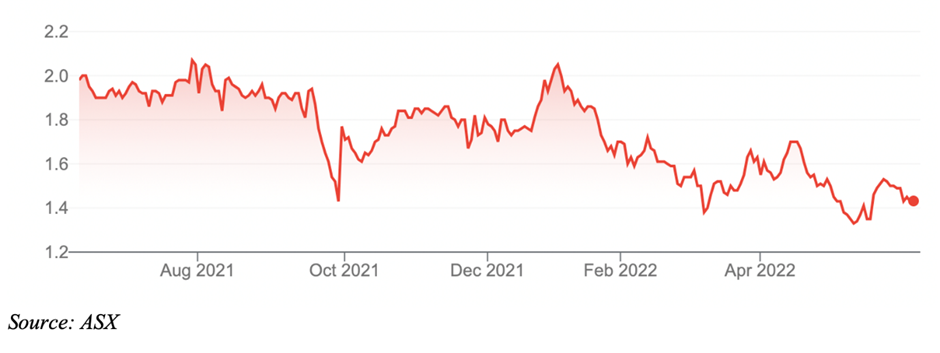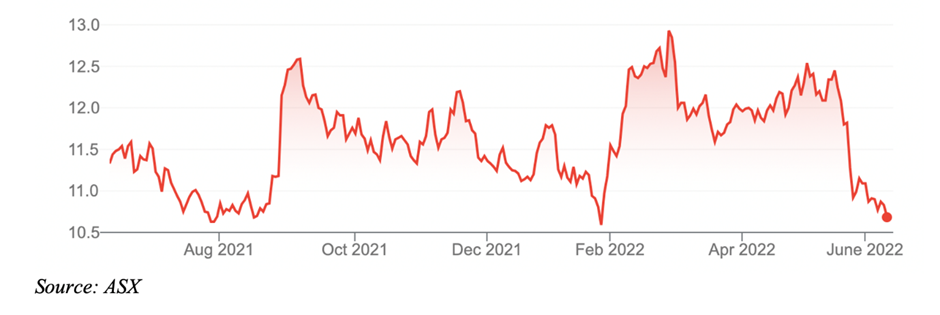Security Alert: Scam Text Messages
We’re aware that some nabtrade clients have received text messages claiming to be from [nabtrade securities], asking them to click a link to remove restrictions on their nabtrade account. Please be aware this is likely a scam. Do not click on any links in these messages. nabtrade will never ask you to click on a link via a text message to verify or unlock your account.
Three defensive small-caps for the current market
When will Private Equity (PE) firms pull the trigger on more small-cap takeovers? With so much capital available, PE firms have the firepower to snap up small-caps.
Now is ideal. The S&P/ASX 200 Index is down about 13% year-to-date after this week’s massive sell-off. Interest-rate fears in the US have spooked investors.
Small-cap industrial stocks in Australia have been belted. As so often happens, investors have retreated to the perceived “safety” of defensive large-cap stocks.
That’s an opportunity for PE firms. Some terrific small-cap industrials are well-off their 52-week highs, even though they have reasonably resilient earnings. They must look attractive to PE firms that want to acquire and privatise more listed companies.
In the past few years, private capital (including superannuation funds) has bid for large and small-cap stocks. They include Sydney Airport, Atlas Arteria, Ramsay Health Care, Virtus Health, Hansen Technologies, Appen, Brambles and other companies.
Only a few of these bids have so far succeeded. Thankfully, company boards are better these days at rebuffing private-equity bids or holding out for a higher price for shareholders. In years past, too many boards rolled over too easily with takeovers.
As I have written many times for this Report, investors should never buy stocks because of takeover speculation. Identify quality, undervalued companies and treat any takeover bid as a bonus. Spotting takeover targets is hard enough; getting the timing right is largely guesswork. Many takeover targets stay that way for a long time.
That said, identifying potential takeover targets for PE firms is a useful exercise. It forces investors to think about small-cap companies that a) have a quality business, b) are undervalued, and c) would be more valuable under private ownership.
My preference in this market is defensive small-cap companies. I’m most wary of cyclical small-cap industrials, such as retailers. Small-caps exposed to consumer discretionary spending face tough times as rising interest rates will force households to tighten their budgets. Cyclical stocks are tough going in this market.
I prefer small-caps that have a high proportion of recurring revenue, and demand for their product that is less affected by rising inflation and interest rates. That is, quality, undervalued small-caps industrials that appeal with or without a takeover.
Here are three stocks that meet my criteria:
1. Hansen Technologies Limited (HSN)
Hansen has been one of this market’s most consistent small-caps. The company develops and sells billing software for utilities, energy, pay-tv, telecommunications and other sectors. That’s mission-critical software for companies in these fields and the type of service that has “high switching costs”, meaning it is hard to change providers.
Hansen has barely missed a beat over the past decade. Revenue has grown consistently each year, earnings are rising, Return on Equity is solid, and debt is low. Hansen has steady rather than speculative performance, but consistency is a vital trait among small-cap companies and particularly in such a volatile market.
It’s no surprise that BGH Capital, a private equity firm, wanted to acquire Hansen last year and was rebuffed by the latter’s board. Hansen was undervalued then and is better value now after share-price falls this year. Hansen’s high recurring revenue and position in utilities software must appeal to takeover predators at the current valuation.
Hansen has shed a quarter of its 52-week share-price high, down from $6.96 to $4.75. The best explanation for that fall is the market sentiment towards technology stocks. Operationally, Hansen continues to perform and is the type of stock that is well placed to weather market volatility, not that you would know it by the share price this year.
Hansen Technologies Limited (HSN) stock price chart

2. Gentrack Group Ltd (GTK)
Like Hansen, Gentrack provides software for the utilities sectors, notably energy, water and airport companies. Also like Hansen, Gentrack has a high proportion of recurring revenue from mission-critical software that utilities use.
Gentrack’s services include billing and customer care, meter data services and data analytics. Its meter data services are interesting as more customers want to understand their home’s energy efficiency via smart meters. Or, in this climate of sharply higher energy bills, ensure that they are minimising unnecessary power usage.
Gentrack, a dual-listed New Zealand company that trades on the NZX and ASX, has a good market position. Some large utilities companies have legacy billing systems that have to be upgraded to provide “green energy” information for customers, some of whom will change providers to get it. Some fund managers I know believe Gentrack is well placed to benefit from this trend because it is nimbler than large software providers.
In its latest investor presentation, Gentrack highlighted the opportunity to provide cleantech solutions for energy and water service providers. Revenue in the first half of FY22 grew 12% over the same period a year ago – a good result in a tough market. Underlying earnings (EBITDA) fell due to Gentrack’s increasing investment.
Gentrack has fallen from a 52-week high of $2.08 to $1.29 amid the general weakness in small-cap tech stocks. The market has over-reacted, dumping good stocks with bad ones.
Capitalised at $130 million, Gentrack is well run, has an expanding global footprint, strong exposure to consumer demand for energy-efficiency data, and continues to grow its presence in the global airports sector.
At some point, that will attract interest from a private-equity firm or another takeover predator if the market does not recognise the full value in Gentrack.
As a micro-cap stock, Gentrack suits investors who understand the features, benefits and risks of this style of investing.
Gentrack Group Ltd (GTK) stock price chart

3. InvoCare Limited (IVC)
I’ve written favourably about the listed funeral operators, InvoCare and Propel Funeral Partners, for this Report over the past few years.
However, InvoCare, the sector leader, has fallen from a 52-week high of $13.19 to $10.24. The stock has been battered in the latest market sell-off, even though the funeral industry is about as defensive as it gets (compared to most sectors).
InvoCare has had a tough few years during the pandemic. Attendance restrictions at funerals during COVID-19, and a milder flu season crunched the funeral operators. As people spent more time indoors and wore masks outdoors, less flu was spread, which meant fewer deaths, particularly among the elderly. And therefore less demand for funerals.
The death rate will eventually normalise and funeral operators will recover. Longer-term, InvoCare has solid avenues for growth through acquisitions and adding services, such as digital funerals, live streaming and online memorials.
InvoCare is not the growth stock it once was, given its now dominant market position. It has less scope to grow quickly through acquisitions due to market-share issues and industry competition. Nor is InvoCare a screaming buy at the current valuation, even with the share price down about 22% from its 52-week high.
But there’s a lot to like about InvoCare and the funeral industry’s long-term growth prospects. InvoCare looks a good fit for a private equity firm and would arguably grow faster under private ownership than as a listed company.
InvoCare Limited (IVC) stock price chart

Tony Featherstone is a former managing editor of BRW, Shares and Personal Investor magazines. All prices and analysis at 16 June 2022. This information was produced by Switzer Financial Group Pty Ltd (ABN 24 112 294 649), which is an Australian Financial Services Licensee (Licence No. 286 531This material is intended to provide general advice only. It has been prepared without having regard to or taking into account any particular investor’s objectives, financial situation and/or needs. All investors should therefore consider the appropriateness of the advice, in light of their own objectives, financial situation and/or needs, before acting on the advice. This article does not reflect the views of WealthHub Securities Limited.
